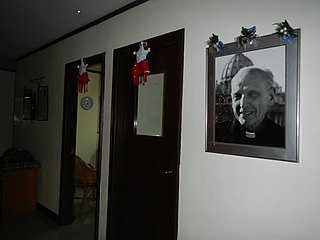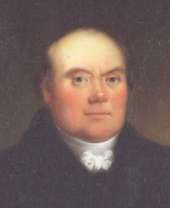A Quote by William James
Even if matter could do every outward thing that God does, the idea of it would not work as satisfactorily, because the chief callfor a God on modern men's part is for a being who will inwardly recognize them and judge them sympathetically. Matter disappoints this craving of our ego, so God remains for most men the truer hypothesis, and indeed remains so for definite pragmatic reasons.
Related Quotes
As to those in whom the will of God is not inwardly accomplished,-because there is no inward life in them, for they are altogether outward,-upon them the will of God is wrought as alone it can be; appearing at first sight bitter and ungracious, though in reality merciful and loving in the highest degree. To those who do not love God, all things must work together immediately for pain and torment, until, by means of the tribulation, they are led to salvation at last.
The ancient man approached God (or even the gods)as the accused person approaches his judge. For the modern man the roles are reversed. He is the judge: God is in the dock. He is quite a kindly judge: if God should have a reasonable defense for being the god who permits war, poverty, and disease, he is ready to listen to it. The trial may even end in God's acquittal. But the important thing is that Man is on the bench and God is in the dock.
To those of us who are not theologians, does it matter whether a thing is ordained or merely allowed? Are events that seem out of control caused by God? Or does He allow them to occur at the hands of human beings? You can spend a lot of time pondering that one and end up pretty much where you started. In either case, the purpose remains the same - our sanctification. God is in the business of making us walking, breathing examples of the invisible reality of the presence of Christ in us.
On accepting adversity in our lives: Always it is initiated by an act of will on our part; we set ourselves to believe in the overruling goodness, providence, and sovereignty of God and refuse to turn aside no matter what may come, no matter how we may feel. I mistakenly thought I could not trust God unless I felt like trusting Him. Now I am learning that trusting God is first of all a matter of the will. I choose to trust in God, and my feelings eventually follow.
Today our (Society of Jesus) prime educational objective must be to form men (and women) for others; men (and women) who will live not for themselves but for God and his Christ - for the God-man who lived and died for all the world; men (and women) who cannot even conceive of love of God which does not include love for the least of their neighbors; men (and women) completely convinced that love of God which does not issue in justice for others is a farce.
In the matter of fellowship God looks not at how much we apprehend of His will but rather at what our attitude towards His will is. If we honestly seek and wholeheartedly obey His desires, our fellowship remains unbroken, even though there should be many unknown sins in us. Should fellowship be determined by the holiness of God, who among all the most holy saints in the past and the present would be qualified to hold a moment's perfect communion with Him?
What do you mean by praying that God will have mercy upon all men, and save them with an everlasting salvation, and then tell the congregation that God has done all He can to save them, and the matter rests with them, whether they will be saved or not?...if God has done all He can, why pray for Him do more? And if He has not done all He can, why tell the people He has?
Some of you may ask, ?Is there a single ordinance to be dispensed with? Is there one of the commandments that God has enjoined upon the people, that he will excuse them from obeying?' Not one, no matter how trifling or small in our own estimation. No matter if we esteem them non-essential, or least or last of all the commandments of the house of God, we are under obligation to observe them.










































